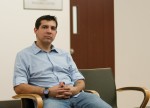The army recruiter came to pick Dustin Halliwell up from his Southern California home in September 2000.
“I think my parents both cried seeing me drive away,” said the former army ranger.
Just thinking about Halliwell being overseas made his family feel emotional. Even watching the news was difficult.
Today, Halliwell helps veterans and active duty servicemen like him as a resiliency trainer for Families OverComing Under Stress or the FOCUS program. FOCUS is part of the UCLA Nathanson Family Resilience Center and helps veterans, active duty servicemen and their families reintegrate back to normal life.
The Nathanson Family Resilience Center’s mission is to help military and veteran families as they cope with the impact of wartime military service and with combat-related physical and psychological health injuries, said Ashley Jupin, an intervention delivery support specialist in the program.
“Reintegration into civilian life following active duty does not only affect the service member – it also has an impact on their family as a whole,” said Patricia Lester, director of the center.
Halliwell was part of the 2nd Ranger Battalion in the army. Serving from 2000 to 2004, he was stationed in Fort Lewis in Washington, serving twice in Iraq and twice in Afghanistan.
He started working with the FOCUS program in May and talks with families to help them with issues such as reintegration and communication.
“It starts with past hurts and hard subjects to talk about” Halliwell said. “I’ve seen a couple families through that have achieved a level of healing and comfort.”
Although working with families while handling his own memories of combat can be difficult, Halliwell said the staff at the FOCUS program supported him. Leading a session about reminders of a family member’s deployment and having exposure to another soldier’s combat experiences triggered memories that he had to reflect on, Halliwell said. By supporting other soldiers, Halliwell relived his own time as an army ranger in combat operations overseas.
“The hardest part was losing friends, and I had some close friends die,” he said. “That was a tough thing to swallow, but (it was) also motivation for me to persevere through my life and live on for them.”
Other staff members of the FOCUS program expressed their patriotism and dedication to the program.
Although Halliwell said he recognizes the difficulty of addressing all of a family’s problems in only six to eight weeks, the typical length of the FOCUS program, he also acknowledges how much they can progress.
“Having something to do with (helping families) has really been very rewarding,” he said. “Making peace with that part of this job and really with that part of myself and of my past was really liberating.”
